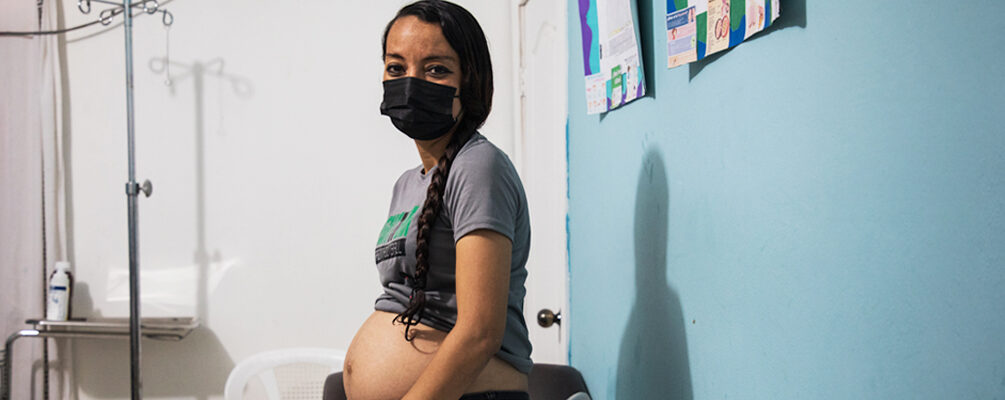New life after the storms
CERF in underfunded emergencies: Honduras
In January 2022, CERF allocated $5 million from its Underfunded Emergencies (UFE) window to support relief operations in Honduras.
Honduras, San Pedro Sula. San Pedro Sula, Honduras’ main industrial hub and second largest city after the capital, Tegucigalpa, lies in the middle of the flood-prone Sula Valley near the country’s north-western Caribbean shores. When Hurricane Mitch struck as a category 5 storm in 1998, it cut a path of destruction through SanPedro Sula, washing away homes and, in some cases, entire communities, causing the kind of damage that would set back the country’s development by years, if not decades. The city again came under siege from extreme storms in 2020, when Eta and Iota barrelled over Honduras as category 4 hurricanes within two weeks of each other, leaving 2.8 million people in need in the midst of the COVID-19pandemic.
Many in poorer areas surrounding the city have yet to recover. Because of the persistent threat of flooding and major storms, such as Tropical Storm Julia that struck in October 2022, humanitarians maintain a constant presence to support the people of San Pedro Sula. In the La Planeta sector of the neighbouring La Lima municipality, some services have still not been fully restored.
Recurrent storms and flooding can leave the Dr. Afonso Hernández Córdova Health Centre in La Planeta inoperable for weeks, or even months on end, disrupting access to health services, including critical sexual and reproductive (SRH) services that nearly 6 out of every 10 women in Honduras say they lack.
The Ministry of Health centre, which has been receiving support from organizations such as UNFPA, Médecins Sans Frontières (MSF) and Doctors of the World for years, has still not been able to restore laboratory or dentistry services since the last major flooding to affect San Pedro Sula.
“We had four floods in one month, water as high as two and a half metres. It took us six weeks to clean up just to provide consultations, we had no working equipment or supplies,” says Dr. Vladimir Rodriguez, the centre’s general practitioner. He says that support from humanitarian organizations has become indispensable to keeping the centre going and building community outreach. The centre relies on a UNFPA-trained network of local volunteers to work with women, including pregnant women. Thanks to these volunteers, women in the community can find out about family planning they might otherwise be unable to access or feel uncomfortable seeking.
“We started this from nothing after the storms… Now it actually makes me smile to see how peer-to-peer support in the communities has spread so much,” says Rodriguez.
CERF funding has allowed for the training of volunteers, as well as the provision of medical supplies and equipment. With the January 2022 allocation, the SRH sub cluster was also able to provide technical assistance to health personnel, install mobile teams at a time when there was no operational health facility to provide clinical management of sexual violence, family planning counselling and delivery of contraception, gynaecological and prenatal care. Affected women in shelters and communities also received hygiene kits and information on the importance of SRH care during emergencies.
Thirty-year-old Kensi said she and her partner planned her pregnancy with support from the community volunteer network.
“The trust we have with the volunteers is important, they have to be patient with us pregnant women,” said Kensi, who was scheduled for a check-up with Dr. Rodriguez. “They’re almost like psychologists, talking us through the process from family planning methods through to the decision to become pregnant,” she added.
The counselling provided by the network includes information on routine check-ups, exams and medicines, which Rodriguez notes goes a long way in correcting misconceptions around family planning.
Dispelling these myths are exactly what girls and women in La Planeta need, according to Kensi. “You see 14-, 15-,16-year-old girls becoming pregnant because they haven’t had guidance on family planning, but thanks to the volunteers, we have the knowledge to properly plan our families.”
Rodriguez notes his gratitude for all that humanitarian organizations have done for the volunteer network and the centre. “If it weren’t for the assistance we’ve received, I honestly don’t know how we’d be doing right now.”The network’s success has encouraged Rodriguez to make plans for a women-only clinic.“We’ve outgrown this space, there aren’t any clinics with enough room,” says the young doctor.
Photos by Vincent Tremau. Text by Marc Belanger. With special thanks to UNFPA.
2022
More information:
Allocation summary (UFE 2022)
